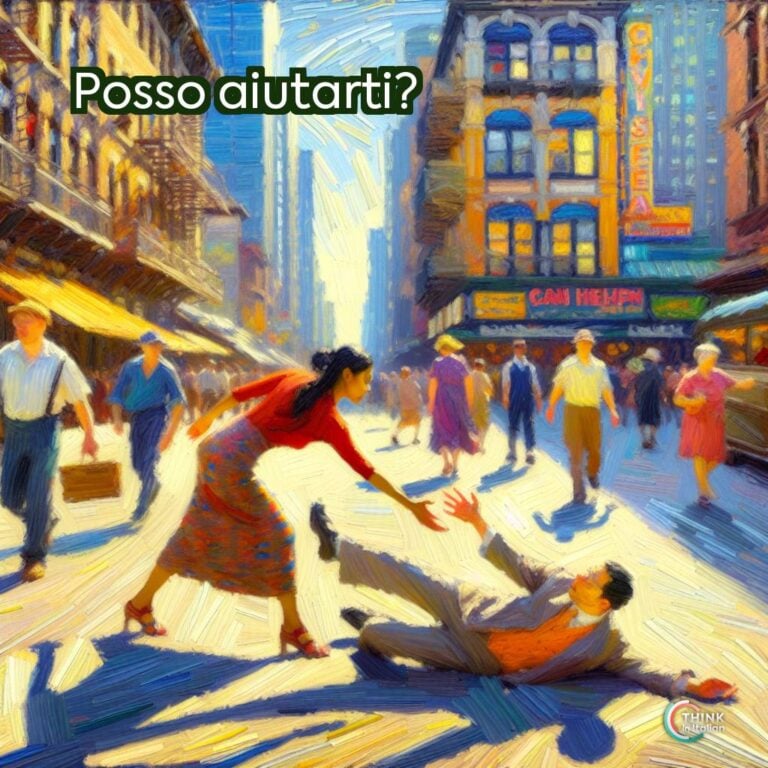The Art of Making Conversation in Italy
Conversations hold an important role in Italian culture: they are a way to build and strengthen relationships, not only to exchange information but also to connect on a deeper emotional level, allowing interlocutors to share experiences and display genuine reciprocal interest.
This cultural emphasis on dialogue is evident in everyday life, from discussions in local cafés and markets to family gatherings and social events. Italians are really good at engaging in conversations, thanks to their expressive communication made of gestures and facial expressions.
If you are looking for a way to have conversations like a real local, then read this article and practice your conversational skills.
How to Start a Conversation in Italian
Greetings
The first thing you want to be able to do when you arrive in Italy is to greet the people you meet. The Italian “Ciao” is the simplest greeting, which means both hello and goodbye, and is suitable for casual settings.
Ciao! Come stai?
Hi! How are you?
As an alternative, you can say buongiorno or buonasera, to say respectively “good morning” and “good evening”. In Italian, we usually say buongiorno in the morning only, and buonasera starting from after lunch.
However, even though I am an Italian native speaker, I always feel there are a couple of hours during the day when it is too late to say buongiorno and too early to say buonasera. And this is the moment when I play the salve card!
The Italian greeting word “salve” is a formal “hello” that you can use in less casual contexts. I love this word because it is the safest bet to greet someone if you don’t know whether you should use “buongiorno” or “buonasera”.
Understanding Formality
Italy values formality in many social contexts. When addressing someone you don’t know, especially if they’re older, it’s respectful to use “Lei” (formal you) instead of “tu” (informal you).
Not only does this shift show respect, but it also sets the tone for a polite and formal interaction. However, if you decide to use the formal lei, make sure you properly conjugate the verbs in the third person singular!
Buongiorno Signora Rossi! Come sta?
Good morning Madam Rossi! How are you?
Small Talk
If you ever traveled to Rome, you might have noticed that Italians always appreciate a good small talk. Simply talking about the weather, food, or sports, can be an easy way to warm things up and lighten the conversation.
Small talk is essential in Italian culture, and if you’re trying to learn Italian, this will help you fill conversational gaps in and keep the exchange going.
Che bel tempo oggi!
Such a nice weather today!
Of course, food and wine are crucial to the Italian culture. Starting a conversation by asking something about someone’s favorite meal is always a good way to make a new friend.
Qual è il tuo piatto preferito?
What is your favorite dish?
Compliments Open Doors
Offering a sincere compliment is something I found universally effective. In Italy, complimenting someone can open up more genuine interactions. Just be sincere and not too personal, and you will have new Italian friends in no time!
Also, first impressions matter. Show that you care about bonding with the Italian culture: use local phrases or slang to demonstrate effort and respect. Phrases like allora (so, well) or dai (come on) will make you sound more like a local and less like a tourist.
Embracing these conversational tools will not only smooth you social interactions in Italy, but it will also enrich your cultural experience. Starting conversations like a local opens doors to deeper connections and more meaningful experiences.
Start by informally greeting someone with “Ciao”, and then get ready to engage in fun and stimulating conversations with Italians.
Do not be too shy to share your thoughts and ideas! Italians really appreciate the effort and are often willing to help, so I promise you will enjoy your interactions and will not feel awkward in any social context!
If you don’t feel ready yet, you can try having a conversation with our AI tutor. But then, promise me you’ll go out and simply talk!






